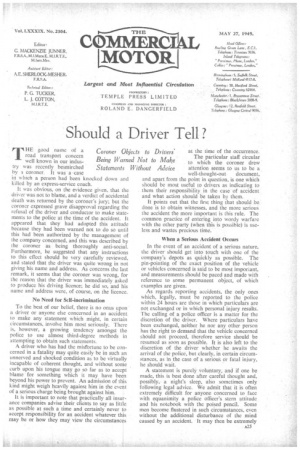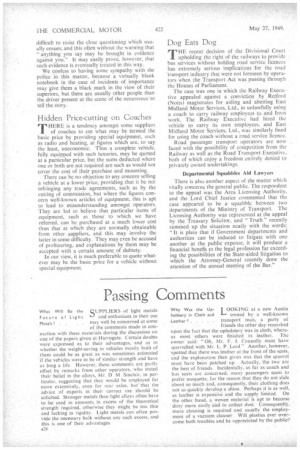Should a Driver Tell?
Page 1

Page 2

If you've noticed an error in this article please click here to report it so we can fix it.
THE good name of a road transport concern well known in our industry was recently besmirched by a Coroner, It was 'a'-case in which a person had been knocked down and killed by an express-service coach.
It was obvious, on the evidence given, that the driver was not to blame, and a verdict of accidental death was returned by the coroner's jury; but the coroner expressed grave disapproval regarding the refusal of the driver and conductor to make statements to the police at the time of the accident. It appeared that they had adopted this attitude because they had been warned not to do so until this had been authorized by the management of the company concerned, and this was described by the coroner as being thoroughly anti-social. Furthermore, he suggested that any instructions to this effect should be very carefully reviewed, and stated that the driver was quite wrong in not giving his name and address. As concerns the last remark, it seems that the coroner was wrong, for the reason that the driver was immediately asked to produce his driving licence; he did so, and his name and address were, of course, on the licence.
No Need for Self-incrimination To the best of our belief, there is no onus upon • a driver or anyone else concerned in an accident to make any statement which might, in certain circumstances, involve him most seriously. There is, however, a growing tendency amongst the police to use almost third-degree methods in attempting to obtain such statements.
A driver who has had the misfbrtune to be concerned in a fatality may quite easily be in such an unnerved and shocked condition as to be virtually incapable of coherent thought, and without some curb upon his tongue may go so far as to accept blame for something which it may have been beyond his power to prevent. An admission of this kind might weigh heavily against him in the event of a serious charge being brought against him.
It is important to note that practically all insurance companies advise their clients to say as little. as possible at such a time and certainly never to accept responsibility for an accident whatever this may be or how they may view the circumstances at the time of the occurrence.
• The particular staff circular • to which the coroner drew attention seems to us to be a well-thought-out document, and apart from the point in question, is one which should be most useful to drivers as indicating to them their responsibility, in the case of accident and what action should be taken by them.
It points out that the first thing that should be done is to obtain witnesses, and the more serious the accident the more important is this rule. The common practice of entering into wordy warfare with the other party (when this is possible) is useless and wastes precious time.
When a Serious Accident Occurs In the event of an accident of a serious nature, the driver should get into touch with one of the company's depots as quickly as possible. The pin-pointing of the exact position of the vehicle or vehicles concerned is said to be most imporiant, and measurements should be paced and made with reference to some permanent object, of which examples are given.
As regards reporting accidents, the only ones which, legally, must be reported to the police within 24 hours are those in which particulars are not exchanged or in which personal injury results. The calling of a police officer is a matter for the discretion of the driver. Where particulars have been exchanged, neither he nor any other person has the right to demand that the vehicle concerned should not proceed, therefore service should be resumed as soon as possible. It is also left to the discretion of the driver whether he awaits the arrival of the police, but clearly, in certain circumstances, as in the case of a serious Or fatal injury, he should wait.
A statement is purely voluntary, and if one be made, this is best done after careful thought and, possibly, a night's sleep, also sometimes only following legal advice. We admit that it is often extremely difficult for anyone concerned to face with equanimity a police officer's stern attitude and his notebook with the poised pencil. Some men become flustered in such circumstances, even without the additional disturbance of the mind caused by an accident. It may then be extremely
difficult to resist the close questioning which usually ensues, and this often without the warning that "anything you say may be brought in evidence against you." It may easily prove, however, that such evidence is eventually treated in this way.
We confess to having some sympathy with the police in this matter, because a virtually blank notebook in the case of incidents of importance may give them a black mark in the view of their superiors, but there are usually other people than the driver present at the scene of the occurrence to tell the story.
Hidden Price-cutting on Coaches Hidden Price-cutting on Coaches
THERE is a tendency amongst some suppliers of coaches to cut what may be termed the basic price by providing special equipment, such as radio and heating, at figures which are, to say the least, uneconomic. Thus a complete vehicle, fully equipped with such luxuries, may be quoted at a particular price, but the sums deducted where one or both are not required are such as would not cover the cost of their purchase and mounting.
There can be no objection to any concern selling a vehicle at a lower price, providing that it be not infringing any trade agreements, such as by the cutting of commission, but where the figures concern well-known articles of equipment, this is apt to lead to misunderstanding amongst operators. They are led to believe that particular items of equipment, such as those to which we have referred, can be purchased at a much lower cost than that at which they are normally obtainable from other suppliers, and this may involve the latter in some difficulty. -They may even be accused of profiteering, and explanations by them may be accepted with a certain amount of dubiety.
In our view., it is much preferable to quote whatever may be the basic price for a vehicle without special equipment.
Dog Ears Dog .
THE recent decision of the Divisional Court upholding the right of the railways to provide bus services without holding road service licences has extremely serious implications for the road transport industry that were not foreseen by operators when the Transport Act was passing through the Houses of Parliament.
The case was one in which the Railway Executive appealed against a conviction by Retford (Notts) magistrates for aiding and abetting East Midland Motor Services, Ltd., in unlawfully using a coach to carry railway employees to. and from work. The Railway Executive had hired the vehicle to carry its own employees, and East Midland Motor Services, Ltd., was similarly fined for using the coach without a road service licence.
Road passenger transport operators are now faced with the possibility of competition from the Railway as well as the Road Transport Executive, both of which enjoy a freedom entirely denied to privately owned undertakings.
Departmental Squabbles Aid Lawyers There is also another aspect of the matter which vitally concerns the general public. The respondent to the appeal was the Area Licensing Authority, and the Lord Chief Justice commented that the case appeared to be a squabble between two departments of the Ministry of Transport. The Licensing Authority was represented at the appeal by the Treasury Solicitor, and " Truth " recently summed up the situation neatly with the words: "It is plain that if Government departments and authorities can be induced to litigate with one another at the public expense, it will produce a financial benefit to the legal profession far exceeding the possibilities of the State-aided litigation to which the Attorney-General recently drew the attention of the annual meeting of the Bar."


























